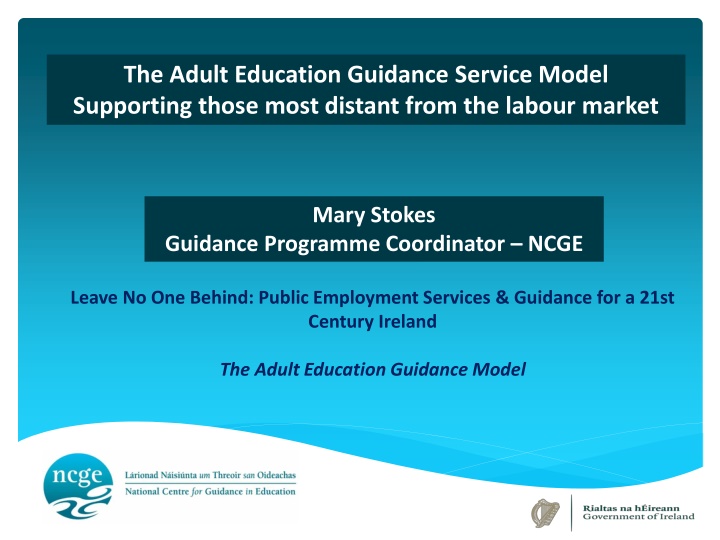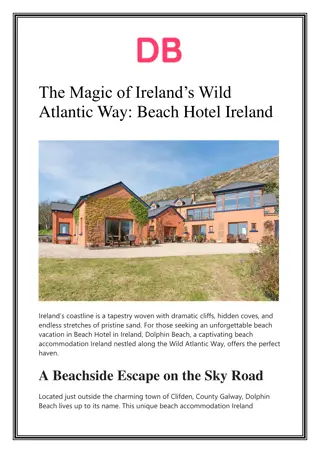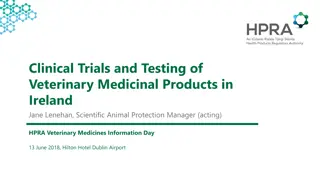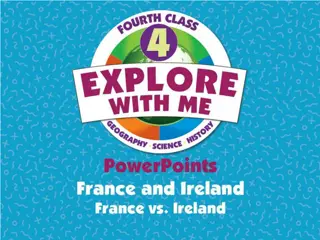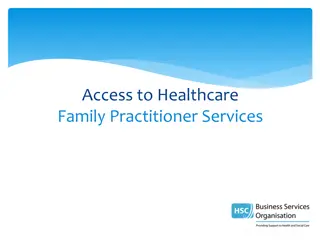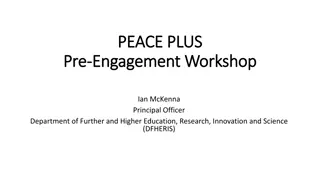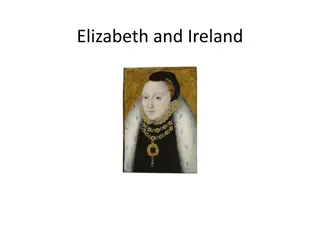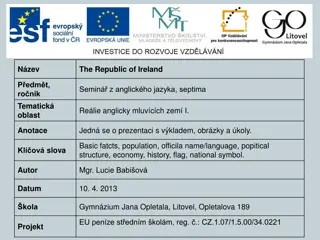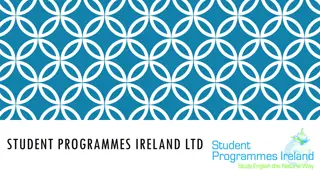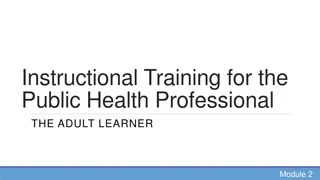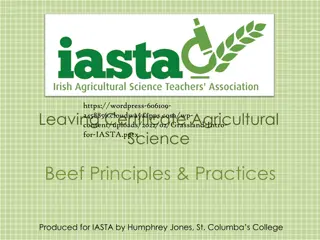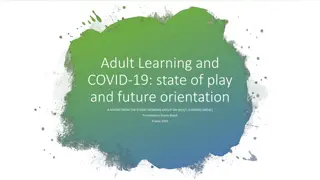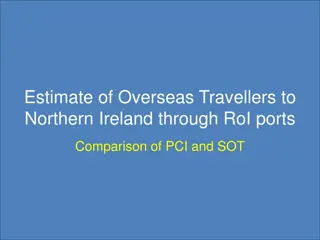Adult Educational Guidance Services Model in Ireland
Adult Educational Guidance Services in Ireland, spearheaded by the NCGE, offer professional guidance to adults returning to education. The model focuses on personal, educational, and vocational guidance, working in partnership with local agencies to meet diverse guidance needs. Operating on a holistic approach, the services aim to support individuals in achieving their full potential and contribute to societal development.
Download Presentation

Please find below an Image/Link to download the presentation.
The content on the website is provided AS IS for your information and personal use only. It may not be sold, licensed, or shared on other websites without obtaining consent from the author.If you encounter any issues during the download, it is possible that the publisher has removed the file from their server.
You are allowed to download the files provided on this website for personal or commercial use, subject to the condition that they are used lawfully. All files are the property of their respective owners.
The content on the website is provided AS IS for your information and personal use only. It may not be sold, licensed, or shared on other websites without obtaining consent from the author.
E N D
Presentation Transcript
The Adult Education Guidance Service Model Supporting those most distant from the labour market Mary Stokes Guidance Programme Coordinator NCGE Leave No One Behind: Public Employment Services & Guidance for a 21st Century Ireland The Adult Education Guidance Model
Guidance for Adults in Ireland AEGS Model of Guidance Guidance in Ireland is provided in the FET sector through various services, supported by NCGE: FET / Adult Education Guidance Services, Colleges of Further Education / PLC Programmes, Youthreach / Community Training Centres, Training Centres, Adult and Community Education, Youth Information, Back To Education Initiative and Prison Services. Information and Guidance Services in the Further Education and Training (FET) sector provide impartial careers and education information, one-to-one guidance and group guidance, which help people to make informed educational, career and life choices. Irish Adult Education Guidance Service Model: Evolved on action research basis since 2000, informed by ELGPN to develop as professional, client centred, adaptable, flexible and accountable model of Adult Guidance provision with distinct roles, responsibilities, delivery and reporting expectations. AEGS model of Guidance Delivery founded on the principals agreed from the National Guidance Forum (2004): Definition of Guidance: Guidance facilitates people throughout their lives to manage their own educational, training, occupational, personal, social, and life choices so that they reach their full potential and contribute to the development of a better society.
Adult Educational Guidance Service Model Background The Adult Educational Guidance Services set up 2000, (NCGE) lead role in co-ordination of development & support of the AEGI by the Department of Education and Skills (DES) AEGS expanded to 37 locations, housed and locally managed by Education and Training Boards (ETBs) AEG services: develop and to deliver professional Guidance services to adults returning to or participating in education opportunities. Pre-entry, entry, ongoing and pre-exit stages; Personal, educational and vocational guidance. Working in partnership at local level, developed links with/ to/ and from various agencies meeting a spectrum of guidance needs of the target groups, employing a range of methodologies including information provision, one- to- one guidance, group guidance and outreach provision. ETB AEGS staff roles: Guidance Counsellor - Coordinator, Guidance Counsellor and Guidance Information Officer Confidential Adult Guidance Management System (AGMS) database monitored and managed by NCGE on behalf of DES and SOLAS, qualitative and quantitative data informs NCGE, SOLAS and DES in planning the provision of guidance to the target groups of the Services. NCGE provides reports to DES and SOLAS arising from the statistics and qualitative information gathered within the AGMS. Guidance is not a numbers business. AEGS do not process clients and merely progress them from one level of education or work to the next. Adult Educational Guidance involves the whole person, a holistic approach to every issue facing the adult learner in their plans to develop their own skills.
Adult Education Guidance Services information and Contact links: The Adult Educational Guidance Services (AEGS) are free, impartial accessible professional Guidance Services available to Adults who may have experienced educational disadvantage, who may be in receipt of social welfare supports and who may benefit from an opportunity to speak with a professional Guidance Counsellor in a confidential meeting, or as part of a Group. AEGS are managed by the 16 ETBs. The ETB AEGS provide impartial careers and education information, one-to-one guidance and group guidance, which help adults who wish to return to education and training, or are already registered on an FET programme within the ETBs to make informed educational, career and life choices. https://www.ncge.ie/ncge/adult-educational-guidance-services Contact links: https://www.ncge.ie/ncge/aegi-contact-details
Adult Educational Guidance Service Model The AEGS targets individuals and groups that experience particular and acute barriers to participation and are more difficult to engage in the formal learning process. Working to address the Guidance needs of DES named Target Groups, AEGS developed a flexible, dynamic, responsive, quality assured model of Guidance Provision There is good evidence from the reports that the 52,885 clients who have benefitted from AEGI services in the year 2017 have availed of professional, impartial, confidential and informed Guidance and Information from the AEGI. Adults and young people aged over 16 who left school with low or no formal qualifications or low literacy levels The unemployed, long-term unemployed and those at risk of becoming long-term unemployed, especially those in the older age groups Those not in work but not eligible to be on the Live Register Those in the workplace with basic skills needs Men and women who have particular experience of barriers to participation including those experiencing rural isolation Lone Parents and others with caring responsibilities that may prohibit their participation in full time courses Homeless People, Substance Misusers, Ex-offenders People with Disabilities, People for whom English is not the mother tongue, who require language and literacy supports Former residents of designated education institutions and eligible family members.
Guidance in Adult Literacy and Community Education Integration of Guidance The Department of Education guidelines state that guidance should be a key aspect of Adult Literacy and Community Education programmes and should be available at all stages, including pre-entry and pre exit stages, on an integrated basis. The Adult Educational Guidance Service (AEGS) provides personal, educational and vocational guidance, which supports learners to make informed decisions about course choice and certification (if required), progression plans, recognition of prior learning etc. Guidance in Back To Education Initiatives (BTEI) may be formal and non formal. NCGE has worked with the Department of Education and Skills on the guidance element of Operational Guidelines for: Adult Literacy - Adult Literacy Operational Guidelines (2012) Back to Education Initiative - BTEI Operational Guidelines (2012) Community Education - Community Education Operational Guidelines (2012) Guidance in VTOS: Guidance in the Vocational Training Opportunities Scheme (VTOS) Guidance in ITABE: Participants on Intensive Tuition in Adult Basic Education (ITABE) programmes
Policy development work undertaken by the members of ELGPN in 200715. European Council (2008) Resolution on better integrating lifelong guidance into lifelong learning strategies. European Council (2010) Guidelines for the Employment Policies of the Member States 2007 2015 Policy development ELGPN European Lifelong Guidance Policy Network Guidelines for Lifelong Guidance Policies and Systems for the Employment and Third Age Sectors suggest: Customised lifelong guidance delivery to different target groups of unemployed adults Using partnership and outreach strategies Develop the capacity of communities Make use of community outreach measures http://www.elgpn.eu/publications/browse-by-language/english/elgpn-tools-no-6-guidelines-for-policies-and-systems-development-for- lifelong-guidance/ The framework and content of the Guidelines are based on the knowledge and experience of members of the European Lifelong Guidance Policy Network in consultation with relevant policy units of DG EAC and DG EMPL, CEDEFOP and ETF, EUPARL, and other European (ETUC, FEDORA/EAIE, European Network of Public Employment Services, Euroguidance) and international organisations (IAEVG, ICCDPP). The Guidelines also draw on knowledge gained from policy studies and reviews of career guidance undertaken by the OECD, The World Bank, UNESCO, ILO and EU agencies such as CEDEFOP, and ETF, and from the experiences of non-EU countries. This tool synthesises the policy development work undertaken by the members of ELGPN in 2007 15. The ELGPN acknowledges the support of Dr John McCarthy in the development of the Guidelines.
ELGPN Guidelines Suggest Citizen-centred: publicly funded lifelong guidance services and products exist to serve citizens. Such services and products are accessible, without discrimination, in a flexible and secure manner allowing for the personalisation of services. Citizens have a key role in their design and evaluation. Holistic inclusive approach: publicly funded lifelong guidance services and products recognise the life experience, the life-stage, diversity, gender, and the social and economic circumstances of citizens. Ease and equity of access: citizens can access publicly funded lifelong guidance services and products through multi-channel service delivery (face to face, letter, phone, email, and internet). All citizens have access to the same level of services. Transparency: citizens are made aware of and understand the nature of the lifelong guidance services and products provided the processes and procedures involved, and the rationale behind these. Individual and group differences in career management skills: policies for publicly funded lifelong guidance services and products recognise that individuals, groups and communities differ in their competence to manage their learning and work pathways. They support citizens to become competent at planning and managing their learning and work paths and the transitions therein.
Stakeholder participation and openness: All stakeholders participate in the development of policies and systems for lifelong guidance and are willing to share knowledge (e.g. strategies, methods, concepts, tools, policy evaluations) and stimulate debate in order to advance knowledge and improve problem solving at EU, national, regional and local levels. Efficiency and effectiveness: publicly funded lifelong guidance services and products are able to demonstrate their added value and return on investment to governments and taxpayers. Evidence based policy development: research evidence including policy evaluation is incorporated into policy debates and decisions on lifelong guidance policy and systems development. Outcome focused: policies support and promote learning, economic, and social outcomes from lifelong guidance activities. Professionalisation of services and tools: lifelong guidance services (face to face, distance, telephone) and tools (in any media form) are developed and implemented in accordance with national standards. Staff who perform lifelong guidance activities have the required professional knowledge, competence, and qualifications. Integrated policy approach: policies for lifelong guidance are an integral part of education, training, employment, youth, and social policies. Coherence of policies for lifelong guidance across each of those sectors is supported.
DES-Indecon Review of Career Guidance April 2019 : Recommendations NCGE welcomes the Report s analysis of the current policy framework and organisational structure for career guidance in Ireland. We note that the Report identifies the challenges emanating from the disparate nature of policy, practice and funding provision in guidance. We recognise the Report s acknowledgment that this current status can result in problems of co-operation and co-ordination (p.3). 1. Appoint a National Policy Group to develop a coherent, long-term strategy for lifelong career guidance. 2. Ongoing emphasis on evidence-based policy, including through organisation of a biennial stakeholder forum. Other related Policies & contexts: Action Plan 2016-2020: Generation Apprenticeship is a major expansion project opening apprenticeship into a full range of twenty-first century industries and skill sets. SOLAS co-ordinates the European Globalisation Fund (EGF) programmes on behalf of the Department of Education and Skills and is the designated Intermediate Body for the European Social Fund Programme for Employment, Inclusion and Learning (PEIL) 2014 - 2020
lifelong guidance activities and products may be part of outreach and/or of specialised education and training programmes and part of transition support to learning and work AEGS model experience suggests FET Guidance provision demands: Communication Cooperation & Collaboration Guidance Awareness Reporting Flexibility & Dynamism Commitment Clarity Understanding of Roles, Boundaries and Responsibilities Appropriate Qualifications & Training
Go raibh maith agaibh Thank you mary.stokes@ncge.ie
